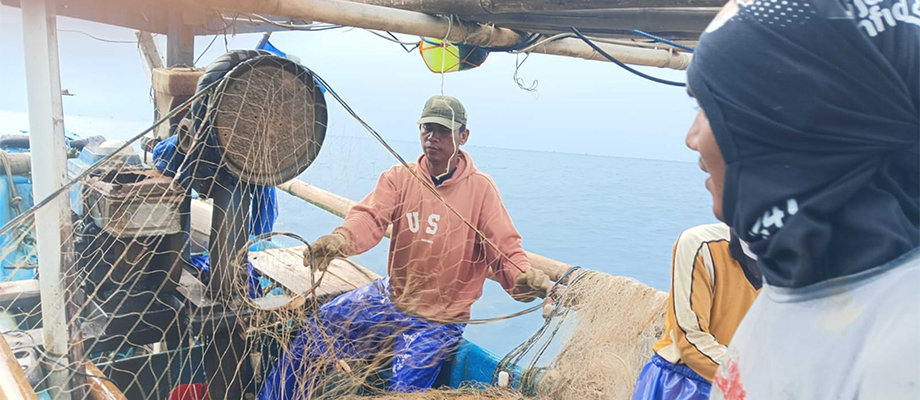Passing the baton: bolstering young fishers’ roles for sustainable fisheries resources
Room for women’s empowerment and roles

Agus with his net in his boat. Agus and other fishers promote the use of environment friendly fishing gears for fisheries sustainability.
A small fisher, Agus Riyadi realized that the waters around Binuangen, West Java has high fisheries potentials and has been an essential source of livelihood for his family and local communities. “We need to protect the fisheries resources here and actively monitor their utilization, especially from illegal fishing practices.”
Most local fishers, he explained, have good awareness on responsible fisheries. They are now using environment friendly fishing gears, however, problems usually emerge with andon/migratory fishers. “Some andon fishers may have lack of awareness and use bomb, anaesthetic, or cantrang/bottom trawl. Other fishers and I actively monitor migratory fishers’ activities and when they use illegal fishing gears, we notify the Indonesian Navy to take action.”
“We have the technology and the network to promote that (responsible fishing) for marine and fisheries resources sustainability,” he added.
Agus was one of the 60 recipients of 2022 Vessel Monitoring Aids (VMA) distribution in Binuangen village jointly conducted with FAO and the Ministry of Marine Affairs and Fisheries (MMAF) . The VMA’s features include catch data reporting, identification of good fishing areas, GPS, weather forecast and distress communication for assistance during emergency. The VMA distribution included training sessions to empower fishers with skills and knowledge not only to use the device but also to promote safety at sea and compliance to regulations.
On the one hand, the devise help fishers to save fuel, ensure better catch per trip and allow them to report their catch. On the other hand, policy makers and academia/researchers have access to reliable fishing activity data to analyse and inform policies for improved fisheries management.
The devise helps promote responsible fishing practices with easy-to-use features. However, the most commonly reported issue is the connectivity especially after they sail beyond 15 Nautical Miles from the coastline. “There is a solution for this though. We can report (catch data) later or switch to use our mobile phone; and when we land at the Fish Landing Site to auction our catch, the officials will also record the catch. The process is transparent” Agus said, adding that there are fishers who try their best to evade regulations to obtain better earning.
The VMA distribution was part of the GEF/FAO supported the Indonesian Seas Large Marine Ecosystem (ISLME) project. Through the project, FAO in partnership with MMAF promoted small scale fishers/farmers (SSF) capacity to perform responsible fishing/aquaculture practices, their compliance to regulations, availability of data for sustainable fisheries management and restoration. The project also helped ensure SSF women and men’s participation in all phases of fisheries activities and in shaping policies. All these are in line with the Voluntary Guidelines for Securing Sustainable Small-Scale Fisheries (the SSF Guidelines) which mark its 10th anniversary in 2024.
For his commitment to responsible fishing, Agus was selected as the 2023 best fisher in Banten province and received an award from local regent. He was offered a role as the head of local Community-Based Fisheries Monitoring (Pokmaswas), a respectable position, which he declined due to his activities.
He stressed the need to give attention to and invest in young fishers’ capacities; and foster their concrete actions to protect sustainability. “I actively encourage young fishers to join education sessions. We need to build their knowledge to adopt responsible fishing, to comply with existing regulations and to engage them as members of Pokmaswas and in decision making process,” he said.
Room for women’s empowerment and roles
Local fishers are susceptible to price fluctuations. Tongkol (mackerel), he said, is locally abundant but when the price of tongkol drop in the market due to various reasons, the fishers would not be unable to sell their catch, and there would be excess tongkol and not few likely go to waste. This is unfortunate, however, from such an incident, Agus saw an opportunity (for local decision makers) to empower and engage local women to process the excess tongkol into various delicacies, like tongkol pindang (steamed and seasoned) and smoked tongkol, among others.
Training for post-harvest processing and marketing, including using online platform are much-needed and should be promoted, especially for coastal women groups. Such training will empower them with skills to prepare ready to serve fish-related products, to ensure food safety and proper packaging to sell locally or for wider market through online marketing.
“Women’s role (in post-harvest processing) is important to prevent food loss, wasted energy and resources. It will be a new opportunity to earn additional income,” Agus said.
